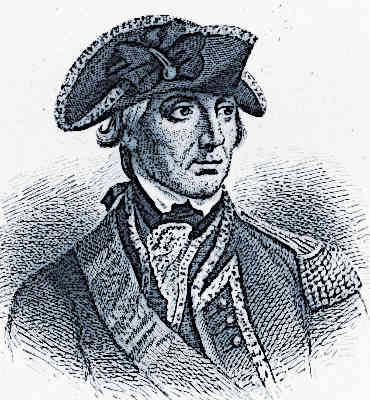British Capture Philadelphia (1777)
What was going on in 1777?
American colonies had declared independence from Britain and were fighting a war against Britain. American colonies had create a parliament of their own, called the Continental Congress. This Congress convened at Philadelphia to make important decisions about the war against Britain.
British forces tried to take back the control of the American colonies but they had to face organised American armies as well as American militias. In 1777, British General William Howe decided to attack Philadelphia in order to capture the city and bring it under British control.

Why did the British want to attack Philadelphia?
General William Howe wanted to fight the main American army, under General George Washington. He thought that if he could defeat the main American army, this would reduce American morale and help Britain win the war.
But General George Washington kept avoiding a direct battle with William Howe until he could find a good opportunity. So General Howe thought that if he attacked Philadelphia, which was the major political center of American colonies at the time, Washington would be forced to fight him. It was with this aim that General Howe moved his army to Chesapeake Bay, 90 miles north of Philadelphia.
The attack on Philadelphia
In August, 1777, General Howe was at Chesapeake Bay with 15000 soldiers. General Washington, on the other hand, had 11000 soldiers which he positioned between the Bay and Philadelphia, hoping to intercept the British when they attacked.
The British army attacked and the two sides fought the Battle of Brandywine on September 11, 1777. This battle was a victory for the British who continued to advance. American army lost 1000 men and retreated. Although the Americans continued to confront the advancing British army, it couldn’t stop their advance and the British army entered the city of Philadelphia on September 26.
Did the capture of Philadelphia end the war?
In most cases, when one side captured the capital city of the other side, the other side was forced to surrender. But this wasn’t the case in the American revolutionary war. Although the British army was able to take control of the American capital city at the time, the war continued.
George Washington still had a large American army under his control and continued to attack the British army. This led to many minor battles between the two sides, with both sides claiming victory in some.
Aftermath of the capture of Philadelphia
British General Howe had hoped that the capture of Philadelphia would either end the war or force General George Washington into a full-scale battle. Both objectives failed. Howe was replaced by British general Sir Henry Clinton.
The British army had to move out of Philadelphia in 1778 and go to New York to defend the city. So by the end of the Philadelphia campaign, both the British and the American forces were back at their original positions.
In all, the capture of Philadelphia didn’t help Britain. It contributed to the defeat of British General Burgoyne in the north which helped Americans secure the alliance of France.
- American Revolutionary War
- Aaron Burr
- Battle of Bunker Hill
- Battle of Cowpens
- Battle of Freeman’s Farm (1777)
- Battle of Guilford
- Battle of Long Island
- British Capture Philadelphia (1777)
- British Capture Savannah (1778)
- Dutch Join the American Revolution (1780)
- Marquis de Lafayette
- Siege of Yorktown
- Spain Enters the American Revolution (1779)
- The Battle of Valley Forge
- The Minutemen of the American Revolution
- Washington’s Crossing of the Delaware (1776